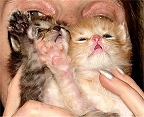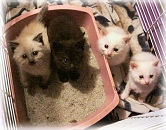
|
Cat poop and pee problems are the #1 reason cats are turned into shelters/re-homed/or most unfortunately abandoned - a lot of people wrongly think cat's think about poo and pee like people do even though they don't - like they are mad at their person or wanting to punish them. I've worked through my own cat pee problems and had to confine the kitty to a small bathroom while I solved the problem - I did this with the goal of putting myself and my own frustration in time out - not yelling or punishing the cat - it worked - I cooled down - and found a solution which was the right litter and an xxx-large and covered box - I was angry at the situation - at the mess - and not knowing how to fix it - so I sympathize with owners experiencing the frustration of pee and poo problems. Cat behaviorists can and do help with poop and pee problems - but they are expensive - like $100-$250 and up for consults - maybe pet insurance covers it for those who have that - I don't know why shelters don't have a hotline for owners who are frustrated to get affordable help to solve these problems which are solvable but require some time and patience. Also, having had cats and dogs and other pets - I'd strongly advise pet owners not to add new cats to resident cats that were not adopted or already living together without doing a lot of planning, preparing, and work to ensure the new cat and resident cat get along. Cats do get lonely in my experience but they like their human not other cats so much on average - maybe the cats tolerate each other but don't like each other - humans are not that good at reading cats or their emotions in my experience - it requires thinking and understanding cat behavior and being careful to not wrongly superimpose human behavior on to the cat. The only happy co-cats I've owned were adopted and raised together as kittens to adults - and even then - sometimes they had their differences but loved each other for the most part. I have good news. The cat is most likely leaving poop in your hallway because he is anxious and afraid and the poop is there to try comfort him with his scent because he now shares your home. Ask yourself the following questions: When did you add the other cat? When did the hallway poops start? What other changes have you made from the cat's perspective? Type of litter? Litter location? Type of food? The leaving the poop in prominent hallways to mark territory and ease the cat's anxiety is called middening, which most owners find maddening. First, make sure which cat is in fact the hall pooper. I would confine each cat separately to make sure which one is in fact the hall pooper or use a nanny cam to identify the one leaving droppings in the hall. Then when you are certain of the identity of the pooper - use an enzymatic cleaner to remove the scents from the hallway where the cat has pooped regularly. Second, you can buy and spray a calming pheromone that mimics momma cat smell on the cat's bedding and buy them as plug ins to help lower his anxiety. Third - in a two cat household - the cats each need their own equal and separate resources - litter, food, water, scratching posts, places to rest, so their smells are distributed equally. Fourth - try to make sure they both have a consistent schedule with you of being played with, fed, petted - cats are very sensitive to changes in the household and schedule changes - so lots of changes mean more stress for cats - even if those changes aren't considered stressful from a people perspective Fifith - make sure the litter boxes are clean and easy to access and not located near a noisy appliance Sixth - you could try keeping them separately in different rooms to reduce stress and competition - which would likely reduce the hall pooping and give each cat their own territory on a temporary basis. Hope this helps. https://www.kittyhelpdesk.com/help-desk/cat-middening https://www.petful.com/pet-health/cat-refuses-to-use-the-litter-box/ https://neeness.com/why-is-my-cat-licking-himself-so-much/ https://journals.sagepub.com/doi/pdf/10.1177/1098612x14539092 |
|
|||||||||||
|
|
|
Finding the right Kitten - Kitten or Cat? - Adopt a Cat for Life - Kitten Development - Kitten Age - Kitten Formula Recipe - Kitten Diet - Kitten Tips - Potty the Kitten - Kitten Hydration - Rehydrate the Kitten - Conjunctivitis - Runny Eyes - Eye Infections - Eye Discharge - Third Eyelid - Feline Infectious Diseases - (FIV) - (FeLV) - (FIP) - Feline Aids - Feline Leukemia - Rabies Vaccine - Feline Herpes Virus - Feline Distemper - Kitten Health Dangers - Kitten Ilnesses - Kitten Diseases - Preventative Care - Spaying and Neutering - Fixing - How to play with your Kitten - Kitten Toys - Kitten Bonding - Coccidial Infections (Coccidia) - Giardia - Cryptosporidium - Toxoplasmosis - Roundworms - Hookworms - Tapeworms - Pinworms - Whipworms - Fleas - Ticks - Ear mites - Injuries - Sneezing - Poisonous Plants - Cute Kitten Videos |
| Webdesign and Photos by SmilingPages.com in Support of the Rainbow Wildlife Rescue - Privacy Policy |

